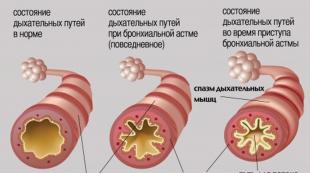General participle. Generalization and systematization of the studied
A gerund may have dependent words. Together 5P with them, it forms a participle turnover. For example, in the proposal of the Court, they did not go out to sea, settling in the harbor (A. Novikov-Priboy) with the gerund participle settling there is a dependent word in the harbor: settling (where?) in the harbor.
Settling in the harbor is a participial turnover.
Participial turnover in the proposal there is one participant in the proposal - an event.
adverbial turnover and Predicate:
184. Write out the verbs with the adverbial phrases related to them.
1. Grandmother under no circumstances strayed in the forest, accurately determining the way to the house. 2. I need a coniferous forest ringing, shaking off drops of dew from its green paws. 3. Somewhere close thunder struck, frightening everyone. 4. Sitting by the window, the grandmother twisted threads for lace.
5. The girl is naughty, does not want to go to sleep without saying goodbye to me. 6. “Goodbye, until the next day,” the girl said, holding out her hand to me. 7. Having read Pushkin's fairy tales a couple of times, I already knew them by heart.
(M. Unpleasant)
185. Read the text, replacing the verbs in brackets with gerunds. Find out the style of the text and the type of speech. Analyze the structure of the text, highlighting the introduction, conclusion and main part in it. Develop a question mark.
Write down the verbs with the adverbial phrases related to them.
The result of the action of a force depends not only on the magnitude of this force, but also on the area of the surface perpendicular to which it acts.
Let's look at examples. On loose snow, a person walks with difficulty, deeply (fall through) at every step. But, (put on) skis, he can walk in the snow, practically not (fall through) into it. Because of which? On skis or without skis, a person acts with the same force equal to his own weight. But the impact of this force is different in both cases, due to the fact that the surface area on which a person presses with and without skis is different. The surface area of the ski is twenty times the area of the sole.
Based on this, (to be) on skis, a person acts on any square centimeter of the snow surface area with a force twenty times less than (to be) on snow without skis.
This means that the result of the action of the force depends on what force acts on each unit of surface area.
In writing, the participial turnover and the participle on both sides are separated by commas if they are in the sentence, and by one comma if they are at the beginning or at the end of the sentence.
Using this rule, reason like this: Turning the switch, the boy turned on the light - lit (at the time when?) By turning the switch. Turning the switch is a participial turnover, it is at the beginning of the sentence, at the end of it a comma is placed.
186. Write off, highlighting the adverbial phrases with commas. Highlight gerunds and participles as members of the sentence.
1. The wolf at night, thinking to get into the sheepfold, got into the kennel. 2. Sensing gray so close to the bully, the dogs burst into the stables. 3. On the spruce tree, Crow, perched up to have breakfast, was just about ready. 4. The frog in the meadow, noticing Ox, started to catch up with him in stature.
5. Loving solitude, the timid Chizh chirped to himself at dawn.
(I. Krylov)
187. Write off, placing the missing punctuation marks. Designate graphically adverbial phrases (see the example in the box).
Select spelling letters in the roots of the words of the first sentence.
1. The old man sat sullenly on the irradiation, turning away from me and was silent sometimes only grunting. (A. Pushkin) 2. I quickly climbed to the other side and went to the left along the aspen forest. (I. Turgenev) 3. The tarantass drove into the yard, rustling its wheels through the nettles, and stopped in front of the porch. (I. Turgenev) 4. After half a minute, the nightingale allowed a high small fraction to enter and, having tried it, his own voice began to sing. (BUT.
Chekhov) 5. In the sky, without movement, there were hawks spreading their wings and fixing their own eyes on the grass. (M. Unpleasant)
188. Replace the phrases with an unknown form of the verb placed in brackets first with the participle, and then with the participle. Write down the sentences that turn out, separating the adverbial and participial phrases with commas and designating them as members of the sentence.
1. An athlete (complete relatively recently the standard of the master) was included in the national team. 2. Marathon runner (to win first place) also took a special prize for the will to win. 3 Junior (to run the hundred meters fastest of all) helped his own team to take the lead.
4. Long jumpers and high jumpers (not to have a single defeat this season) keep hoping to become winners in the upcoming international competition. 5. My friend (training hard day in and day out) became a famous gymnast over time.
189. Look at the pictures and read the sentences. Add a participial turn to each sentence in order to more accurately describe the main impact.
Designate adverbial phrases.
1. Seryozha is standing, _ _ _.
2. Seryozha sat down, _ _ _.
3. Seryozha bent down, _ _ _.
4. Seryozha lay down, _ _ _.
190. Make sentences according to these schemes.
191. Read fragments from N. Gogol's story "Taras Bulba". What role do adverbial constructions play?
They characterize only the movement of the brave men or convey their state of mind at decisive moments of fate: Taras during the execution of Ostap, when meeting with the traitor Andriy; Andria in battle on the side of the enemy? Write off, placing the missing punctuation marks and emphasizing gerunds and participles as members of the sentence.
1. Taras stood in the crowd with his head bowed, and at the same time, raising his eyes and appraisingly, he only said good to his son!
2. Well, what are we going to do now? - said Taras looking directly into his eyes. But (not, not) anything (not) Andriy had the opportunity to tell, and stood with his eyes downcast in the soil.
3. And what about my father, comrades, fatherland? - said Andriy, quickly shaking his head and straightening up straight, like a poplar sorrel, his own camp. - So if so, so here's the thing: I don't have (not, none) anyone! (not, none) anyone! (not, none) anyone!
4. Hitting the horse with sharp spurs in full force, he fell behind the Cossacks (not) looking back (not) seeing that only twenty people managed to keep up with him from behind.
Source: tepka.ru
Look for a job without mistakes: Participles
Fascinating entries:
A selection of articles you might be interested in:
July 23, 2015 What is participle turnover? What specific punctuation marks are used in writing to highlight the adverbial phrase? What is the role...
Participial turnover. commas in participial turnover Purpose: to introduce students to the participial turnover; develop the ability to detect it in ...
Popular answers Similar answers Some linguists calculate gerunds with a special form of the verb, others - with an independent part of speech. Adverb is…
Escalade-Z › Blog › How turbines work At a time when they talk about racing or sports cars, the topic of turbocharging quite often pops up ....
Punctuation marks for comparative turns Comparative turns. starting with comparative alliances, as if, quite right, as if, ...
If a lady is going to give birth to a child or is already pregnant, then she must know what specific payments she is entitled to. AT Russian Federation created...
You may also like
Added by 1 day ago
0 Views0 Comments0 Likes
Domestic tips for passing the game The Crew will look at the most important points of the game: how to level up and how to gain experience in the game The Crew, what specific modes exist and their meaning, how soon...
A gerund may have dependent words. Together with 5P with them, it forms a participle turnover. For example, in a sentence Vessels did not go to sea, settling in the harbor(A. Novikov-Priboy) with gerunds defending there is a dependent word in harbor: defending(where?) in the harbor. Settling in the harbor- participial turnover.
The adverbial turnover in the sentence is one member of the sentence - the circumstance.
Predicate and adverbial turnover:
184. Write down the verbs with the adverbial phrases related to them.

1. Grandmother never strayed in the forest, unmistakably determining the way to the house. 2. A coniferous forest rings above me, shaking off drops of dew from its green paws. 3. Somewhere close thunder struck, frightening everyone. 4. Sitting by the window, the grandmother twisted threads for lace. 5. The girl is naughty, does not want to go to bed without saying goodbye to me. 6. “Goodbye, see you tomorrow,” said the girl, holding out her hand to me. 7. Having read Pushkin's fairy tales several times, I already knew them by heart.
(M. Gorky)
185. Read the text, replacing the verbs in brackets with gerunds. Determine the speech type and text style. Analyze the structure of the text, highlighting the introduction, body and conclusion in it. Make a question plan. Write down the verbs with the adverbial phrases related to them.
The result of the action of a force depends not only on the magnitude of this force, but also on the area of the surface perpendicular to which it acts.
Consider examples. On loose snow, a person walks with great difficulty, deeply (falling through) at every step. But, (put on) skis, he can walk in the snow, almost not (fall through) into it. Why? On skis or without skis, a person acts with the same force equal to his own weight. But the action of this force is different in both cases, because the surface area on which a person with skis and without skis presses is different. The surface area of the ski is twenty times the area of the sole. Therefore, (to stand) on skis, a person acts on each square centimeter of the snow surface area with a force twenty times less than (to stand) on snow without skis.
This means that the result of the action of the force depends on what force acts on each unit of surface area.
Applying this rule, reason like this: Turning the switch, the boy turned on the light - lit(when?) turning the switch. Turning the switch- this is a participial turnover, it is at the beginning of the sentence, after it a comma is placed.
186. Write off, highlighting the adverbial phrases with commas. Underline the participles and participles as members of the sentence.
1. The wolf at night, thinking to get into the sheepfold, got into the kennel. 2. Sensing gray so close to the bully, the dogs burst into the stables. 3. On the spruce tree, Crow, perched up to have breakfast, was just about ready. 4. The frog in the meadow, seeing Ox, started to catch up with him in stature. 5. Loving solitude, the timid Chizh chirped to himself at dawn.
(I. Krylov)
187. Write with missing punctuation marks. Designate graphically adverbial phrases (see the sample in the box). Underline the spelling letters in the roots of the words in the first sentence.
1. The old man sat sullenly on the irradiation, turning away from me and was silent from time to time only grunting. (A. Pushkin) 2. I quickly climbed to the other side and went picking up to the left along the aspen forest. (I. Turgenev) 3. The tarantass drove into the yard, rustling its wheels through the nettles, and stopped in front of the porch. (I. Turgenev) 4. After half a minute, the nightingale let out a high small fraction and, having tried his voice in this way, began to sing. (A. Chekhov) 5. The hawks stood motionless in the sky, spreading their wings and fixing their eyes on the grass. (M. Gorky)
188. Replace the phrases with the indefinite form of the verb placed in brackets first with the participle, and then the participle. Write down the resulting sentences, separating the adverbial and participial phrases with commas and designating them as members of the sentence.

1. An athlete (recently complete the master's norm) became a member of the national team. 2. Marathon runner (to win first place) also received a special prize for the will to win. 3 Junior (run the hundred meters fastest) helped his team to take the lead. 4. High jumpers and long jumpers (not to have a single defeat this season) hope to become winners in the upcoming international competition. 5. My friend (training hard day after day) became a famous gymnast over time.
189. Look at the pictures and read the sentences. Add a participial phrase to each sentence to more accurately describe the main action. Designate adverbial phrases.
1. Seryozha is standing, _ _ _.
2. Seryozha sat down, _ _ _.
3. Seryozha bent down, _ _ _.
4. Seryozha lay down, _ _ _.

190. Make sentences according to the given schemes.

191. Read excerpts from N. Gogol's story "Taras Bulba". What role do adverbial constructions play? They characterize only the movement of the heroes or convey their state of mind at the decisive moments of life: Taras during the execution of Ostap, at a meeting with the traitor Andriy; Andria in battle on the side of the enemy? Write off, placing the missing punctuation marks and emphasizing gerunds and participles as members of the sentence.
1. Taras stood in the crowd with his head bowed, and at the same time, raising his eyes, he only spoke kindly to his son kindly!
2. Well, what are we going to do now? - said Taras, looking directly into his eyes. But (not, not) anything (not) Andriy could say to that and stood with his eyes downcast on the ground.
3. And what about my father, comrades, fatherland? - said Andriy, quickly shaking his head and straightening up all straight, like a sapling sedge, stand his own. - So if so, so here's what: I don't have (not, none) anyone! (not, none) anyone! (not, none) anyone!
4. Hitting the horse with sharp spurs at full speed, he fell behind the Cossacks (not) looking back (not) seeing that behind only twenty people managed to keep up with him.
An additional action performed by a pronoun or noun in Russian is called a participle turnover. The article contains the rules for writing it in a sentence, exceptions to the rules, as well as various options use of adverbial turnover.
What is a participle in Russian?
Participial turnover- This is a speech construction consisting of a gerund and words dependent on it. The adverbial phrase indicates an additional action that is performed by a noun or pronoun (represented by the subject in the sentence), and usually refers to a verb (predicate). Answers the questions - What do you do? Having done what?
Suggestion example: Without opening your eyes I enjoyed the morning birdsong.
The green line underlines the adverbial turnover, and the red line - the verb-predicate to which it refers.
The participle as a part of speech, as well as the rules for using participles, are studied in the 7th grade.
What is an adverbial phrase in a sentence?
As a rule, in a sentence, the adverbial turnover performs the syntactic role of a circumstance and is separated by commas.
Examples:
Smoke, enveloping houses, went up (rose up - how? - enveloping houses).
I take notes while reading a book (I make notes - when? - while reading a book).
I thought problem solving (thinking - when? - solving the problem).
Simple sentences with adverbial phrases are usually called sentences with a complicated isolated circumstance.
TOP 5 articleswho read along with this
Spelling of adverbial turnover
In sentences, the adverbial turnover is distinguished by commas on both sides (separated) regardless of the position it is in relative to the verb-predicate. In addition, adverbial phrases in a sentence are always separated from conjunctions by commas.
Examples:
I took the book going to closet.
drinking water I quenched my thirst.
We have worked hard and done with business decided to take a break.
Exception. If the adverbial turnover is a phraseological unit, then in the sentence it is not separated by commas. Examples: I ran headlong. They work slipshod.
Note! The adverbial turnover is used only in cases where it denotes an additional action of the same person (object, phenomenon) as the main verb. In other cases, the adverbial turnover is not used. An example of a violation when using a participial turnover: Choosing fruits, I liked red apples(subject - apples, predicate - liked, participial turnover choosing fruit semantically refers to the secondary member of the sentence to me).
Sentence examples
- He ran out slamming the door behind you.
- Driver, noticing a traffic light, pressed the brake pedal.
- Be sure to complete the practical tasks, preparing for the exam.
- Resting in the forest, remember about fire safety.
- Buying products you should look at the expiration date.
An example of incorrect use of the adverbial turnover:
Approaching the apartment, rustles were heard outside the door.
The main action is performed by rustles (rustles were heard). But the action of the adverbial turnover (Going up to the apartment) is directed to another object (for example, he or I).
Lesson Objectives:
I. Educational:
- Generalization and systematization of information about gerunds and gerunds.
- Repetition of orthograms associated with the spelling of vowels in roots with alternation.
- Repetition of spellings associated with spelling NOT with gerunds, verbs.
- The use of adverbial phrases in speech.
- Activation of students' vocabulary.
- Repetition of phraseological units.
- Consolidation of the ability to find adverbial phrases and put punctuation marks with them; ability to distinguish adverbs from adverbs.
II. Educational:
- Education of love for the Russian language literature.
- Formation of control and self-control skills.
- Formation of cognitive activity in a team and cooperation in solving search problems.
III. Developing:
- Development of the ability to logically express one's thoughts using literary language.
- Development of the ability to argue, prove.
- Expanding horizons, cognitive interest.
- Development of the ability to highlight the main thing, compare, generalize, structure.
Lesson equipment:
- On the student's desktop: a textbook, notebooks, pens and pencils.
- Table "Formation of gerunds".
- Material for independent work (crossword puzzle).
Lesson structure:
- organizational stage. (1 minute.)
- homework check step. (4 min.)
- Repetition and consolidation of the material:
- The game "Who is faster?" (4 min.)
- Table "Formation of gerunds". (4 min.)
- Are the adjectives the same? (2 minutes.)
- Auction of phraseological turns. (2 minutes.)
- Syntactic analysis, morphological analysis of gerunds. (4 min.)
- Announcements (corrections speech errors in offers). (3 min.).
- The difference between adverbs and adverbs. (3 min.)
- Performing exercise number 141. (5 minutes.)
- Independent work (crossword puzzle solution). (2 minutes.)
- Summing up the lesson homework. (3 min.)
During the classes
I. Organizational stage. (1 minute.)
An epigraph is written on the board: "The language certainly lives, moves, develops and improves." V.G. Belinsky.
- Hello guys. Sit down. What special verb forms do you know? (germs andparticiple). Today in the lesson we will repeat information about the participle and participle turnover. We write down today's date, topic in a notebook. A cheat sheet will help us repeat the topic. See how this word is spelled: crib. Russia is one of many civilized countries where they still use tips in the classroom. cheat sheet means rags, diaper. In Polish, they called this a worthless piece of paper. We have a large cheat sheet on the board, which we will use today in the lesson.
On the desk: Cheat sheet: (as it is repeated, the points of the cheat sheet are circled).
- The concept of adverb.
- The concept of adverbial turnover.
- Punctuation marks for participles.
- Not with adverbs.
- The participles of the perfect and imperfect form.
- Morphological analysis of adverbs.
- The syntactic role of gerunds in speech.
II. homework check step. (4 min.)
At recess, one of the students is doing homework on the blackboard..
Let's start with checking homework. You had to fill in a "blind" table.
Finished table:
| GENERAL PARTICIPLE | ||||
| GRAMMATICAL SIGNS | SYNTAX AND PUNCTUATION | |||
| verb | adverb | Member of the proposal | Isolates itself | |
| 1. Return | Doesn't change | circumstance | the letter is separated by commas on both sides | |
| 2. Transitivity | ||||
| 3. View | owls. | |||
| nesov. | ||||
- Define adverb (a special form of the verb that denotes an additional action with the main action expressed by the verb, and answers the questions what are you doing? what are you doing?).
- Remember when the term "participle" appeared in Russian. (In the 17th century. This word was introduced by M. Smotrytsky, formed by combining the particle dee (from dyati - to do) with the word "participle". Thus, the gerund is "involved" in the action.)
- What is the difference between the perfect participle and the imperfect participle? (Imperfect gerunds indicate an unfinished additional action and answer the question what are you doing? Perfect participles indicate a completed additional action and answer the question what are you doing?)
III. Repetition and consolidation of the material:
1. The game "Who is faster?" (4 min.)
- From the proposed verbs, it is necessary to form gerunds: Option 1 - imperfective gerunds; Option 2 - gerunds of the perfect form. Highlight the suffixes and stems of the verbs from which gerunds are formed. Explain the spelling of the words and the stress in the last word. The first option to complete the task and explain it wins. In what other participles should the accent be remembered? (Rzh a vey, h e rpay).
| noun verb | ger. mismatch | owl verb | ger. owl species | |
| located | location..gaya | locate..live | located..alive | |
| Deputy..Ryut | deputy..rai | deputy..ret | deputy..roar | |
| k..sayutsya | k..sayas | to..sleep | to..waking up | |
| ball At are | ball At being | points BUT to be | points BUT having become |
2. Table "Formation of gerunds". (3 min.)
- Explain what rule you were guided by when performing the previous task. What can be used to form perfect and imperfect participles? (using suffixes).
– Using the table, tell us how perfect participles are formed (from the stem of the indefinite form of perfective verbs by adding suffixes -in, -lice, -shi) and imperfective participles (from the basis of the present tense of imperfective verbs by adding suffixes -а, -я).
- Until the eighteenth century, in the Russian language, gerunds were formed with the help of suffixes - teach, -yuchi. Now these suffixes are almost never used, but the connection of tenses in the language is not lost. The forms of words that store the memory of times have been preserved. Give an example of such a word. ( To be - being).
- It often happens that two or even more participles can belong to one verb, which create a picturesque picture of actions. Find gerunds in E. Asadov's poem and fill in the table with examples. Write down, explain the placement of punctuation marks in this sentence.
Eating from the fresh breeze,
A little blue, strong-boiled,
Holding hands like guys
Stomp, basking, around the hemp!
(E. Asadov)
3. Are the participles the same? (2 minutes.)
- L. Kozyr has a quatrain:
Hills, rising and at dusk melting
and some thought in the folds melting,
they are silent about that, which is not at all simple,
my planet is not at all simple.
What verbs are the underlined participles formed from? ( At dusk, melting (melting) and some kind of thought melting in the folds? (hide)).
4. Auction phraseological units. (4 min.)
Behind the house, barely
The grass turned yellow
Two brothers were chopping wood.
One did it through the sleeves,
The other is rolling up his sleeves.
(V. Viktorov)
- Look at the illustration. The artist made a mistake. What? ( He literally understood the phrases through his sleeves and rolled up his sleeves).
What are these fixed expressions called? (Phraseologisms). Explain the meaning of phraseological units, replacing them with words that are close in meaning. So they say about work done carelessly, somehow. Ancient Russia wore outerwear with excessively long sleeves; their unrolled ends fell to the knees, and even to the ground. Naturally, without lifting such sleeves, there was nothing to think about work. Close to this expression is the second, opposite in meaning and, one might think, born later: “To work with your sleeves rolled up”, that is, decisively, ardently, with full diligence.
- Make up and write down sentences with these phraseological units. Why didn't you separate the adverbial turnover? ( Phraseological units are not isolated). Remember also phraseological turns, where gerunds are used. ( Hand on heart, work tirelessly, listen with bated breath, run with your tongue out, stare with your eyes wide open, walk with your nose up, sit back, rush headlong, reluctantly heart). There is also phraseology unsalted slurping. Once in Russia, salt was a very valuable product, it had to be transported from afar. Salt was heavily taxed. Therefore, food in the old days was cooked without salt. The owner salted the food himself. Whom he loved, he sprinkled more salt. Sometimes, trying to please, the owner oversalted food. That's where the expression came from oversalt. Ignorant guests were seated away from the host. And it happened that they did not get enough salt. That's why they say today unsalted slurping, oh failure, bad reception.
5. Syntactic parsing, morphological parsing. (4 min.)
- After reading the statement of the Persian and Tajik poet Firdousi, explain the meaning of this sentence, the spelling of words, and punctuation marks.
At the blackboard, one of the students performs syntactic analysis, the rest - in a notebook. Another student makes a morphological analysis, which then checks the class.
Without pricking - a participle.
- Morph. confession: unchanged, owl. view.
- You won’t pick (how?) Without pricking.
6. Advertisements. (3 min.)
- When studying gerunds, one should dwell on one of the very common mistakes - the incorrect use of gerunds in speech and writing.
Which ads do not contain speech errors?
- "Check money without leaving the cash desk!"
- “Passing past the shop window, the glass can break!”
- "Check bags and wallets leaving the store!"
- “When entering the store, leave the dogs on the street!”
– With the correct use of the adverbial turnover, the same actor must perform both the main and the additional action.
7. The difference between gerunds and adverbs. (3 min.)
- In a sentence Dasha listened silently, often closing her eyes.(Gorbatov) find the participle, put punctuation marks.
- Single gerunds can lose the signs of a verb and move into the category of adverbs. In this case, the former participles cease to denote a secondary action (they cannot be replaced by verb forms, they usually cannot be asked questions doing what? having done what?), but denote only a sign of action, like adverbs, and answer the question how? Participles that have passed into the category of adverbs are not separated by commas.
Closing- a gerund, since it has dependent words and can be replaced by a verb form (cf .: Dasha listened and often closed her eyes).
Silently- an adverb, since it no longer denotes an additional action (one question is asked to it as?; question doing what? cannot be specified); in this context cannot be compared as equal actions: listened to and was silent(silence accompanied the only action - listened to).
8. Performing exercise number 141.
Complication of the task: continue the sentences not with one, but with several homogeneous adverbial phrases. Highlight them.
- Serezha sat down. Serezha sat down, stretching his arms forward and straightening his back.
- The series is worth it. Seryozha stands with his hands on his belt and legs apart shoulder-width apart.
- Serezha bent down. Serezha bent down, dropping his hands and turning his head to the left.
- Serezha lay down. Serezha lay down, lifting the dumbbells up and stretching out his toes.
9. Independent work (4 min.).
The solution of the crossword "Green participle".
Exercise. Choose from the three proposed options the word that has the named feature.
Horizontally:
3. Invariable special form of the verb: explored, stirred up, ponder.
6. A gerund derived from an intransitive verb: seeing, crouching, named.
7. A gerund with an obsolete suffix: taking off, being, writing off.
8. A verb that does not form a gerund: reap, live, give.
9. Perfect participle formed with the suffix -ya: reading, taking, taking.
10. The participle acting as a circumstance of the mode of action: Laughing, he told about his adventures. Seeing me, she crossed to the other side of the street. After waiting for a moment, he rushed into battle.
11. The participle acting as a circumstance of the cause: Having forgotten the key at home, he was very worried. Arriving at school, Petka told his best friend about what had happened to him. Crying and laughing at the same time, Mishka rubbed his broken knee.
Vertically:
1. Perfect participle: advising, stretching, scattering.
2. Reflexive gerund: rewriting, knocking, dancing.
4. Imperfect participle: running across, locking up, washing up.
5. A gerund derived from a transitive verb: covering, doing, jumping.
Answers.

IV. Summing up the lesson, homework (3 min.)
– Do you agree with the opinion of Viktor Vladimirovich Vinogradov, who called the gerund participle an adverb-verbal category? ( The gerund has signs of an adverb (invariability, syntactic role )and verb (formed from verb, has a common lexical meaning with it)).
References:
- Shustina I.V. Crosswords for schoolchildren. Russian language. - Yaroslavl, 1997.
- Dubrovin M.I. Russian phraseological units in pictures. - M., 1987.









